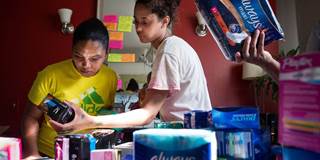In many societies, a woman's period is a topic shrouded in euphemism and secrecy, owing to communal beliefs that can leave girls and women feeling embarrassed, isolated, and insecure. When this is combined with lack of access to sanitary products, or to safe, private places to use them, the results can be socially and emotionally devastating.
LONDON/BALTIMORE – Menstruation is as natural as a heartbeat. And yet, for the world’s most vulnerable women – including refugees, the homeless, adolescents, and those displaced by emergencies – the period can be a distressing, even dangerous, experience.
In many societies, a woman’s period is a topic shrouded in euphemism and secrecy, owing to communal beliefs that can leave girls and women feeling embarrassed, isolated and insecure. When this is combined with lack of access to sanitary products, or to safe, private places to use them, the results can be socially and emotionally devastating.
Difficulties managing menstruation can negatively affect one’s ability to work or attend school, aggravating women’s and girls’ anxiety, stress, and fear. Unsafe menstrual practices also give rise to serious health risks. In parts of Sub-Saharan Africa and South Asia, for example, women and girls are often forced to use ineffective and unhygienic means of protection such as mud, leaves, or dung, which increases the risk of infection.

LONDON/BALTIMORE – Menstruation is as natural as a heartbeat. And yet, for the world’s most vulnerable women – including refugees, the homeless, adolescents, and those displaced by emergencies – the period can be a distressing, even dangerous, experience.
In many societies, a woman’s period is a topic shrouded in euphemism and secrecy, owing to communal beliefs that can leave girls and women feeling embarrassed, isolated and insecure. When this is combined with lack of access to sanitary products, or to safe, private places to use them, the results can be socially and emotionally devastating.
Difficulties managing menstruation can negatively affect one’s ability to work or attend school, aggravating women’s and girls’ anxiety, stress, and fear. Unsafe menstrual practices also give rise to serious health risks. In parts of Sub-Saharan Africa and South Asia, for example, women and girls are often forced to use ineffective and unhygienic means of protection such as mud, leaves, or dung, which increases the risk of infection.